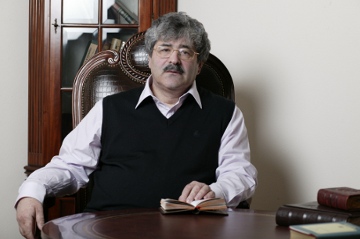
IT'S ALWAYS RISKY to tell a story from hearsay. One inevitably errs in the details. Still, let me give it a try. During a Soviet celebration of Alexander Suvorov's jubilee year, a speaker mounted the podium and made a denunciatory speech about the great general. In it, he depicted Suvorov as a proponent of serfdom, the stifler of Polish freedom, and, most importantly, as the cruel suppressor of the Pugachev Rebellion. An awkward silence followed. Then a well-known biographer of Suvorov took the word and asked the "denouncer," "Do you think, comrade, that, had Pugachev won, he would have instituted Soviet rule in Russia?" The audience laughed.
Ideological surrogates rarely withstand the test of history. Something similar is taking place today.
"Democracy's Hard Spring" was the title of an article in a respectable international magazine that presented an easily predictable interpretation of the tumultuous events in the Middle East. Although "predictable" is not always the same thing as "trite," the two terms coincided in this case. This only goes to show once again that modern positivists are not daunted by anything, including crises, revolutions, and natural disasters. Everything is going according to plan. Libyan rebels are already saying that they will establish a pluralistic parliamentary democracy with limits on executive government. For the time being, they're shooting into the air and destroying cities just like Qaddafi, yet, no matter, they'll calm down and create pluralism, parliament, and democracy. Moreover, it turns out that Islamists, including former members of groups linked to the Al Qaeda, are upholding the values of secular society.
Who would have thought that the budding shoots of democracy in the Middle East have changed the soil of the Arab world to such an extent that even former terrorists wait with hope and anticipation for the first blossoms of democracy to open up in their countries... At the same time, former
Talibs, who had put down their arms and promised to stop fighting, turned out to be the organizers of the deadly attack against the UN office at Mazar-i-Sharif. Among them were people who had rejected open resistance and promised not to take up arms and even to
support the secular government of President Karzai, known for his "achievements" in pluralism and parliamentarianism.
Nevertheless, many Middle Eastern scholars believe that, no matter how things turn out in the end, the Islamization of the Arab world will markedly increase. Moreover, major upheavals are in store for the economies of these countries with inevitable effects on the standard of living. For several years, countries in the region have contained prices on fuel and food products. In 2011, large-scale measures were planned for supporting the standard of living of inhabitants. In Algeria, 156 million dollars had been allocated for social infrastructural projects and tax cuts. In Bahrain, 100 million dollars had been set aside for paying subsidies -about $2,500 to each family. Besides providing direct financial support to families, Libya had planned to raise salaries by 50% in the public sector and abolish taxes and custom duties on food products. Jordan had intended to raise the salaries of military and civil servants, cut taxes, and allocate more money for supporting the poorest segments of the population. And that's not all. Some say that these measures were simply attempts by authoritarian regimes to buy citizens' loyalties. Be that as it may, who will replace these regimes? Who will save the Arab economies from degradation and people from poverty and hunger?
In view of the rapidly growing populations and the inevitable decline of production, only Saudi Arabia can hope to bridge social deficits with the help of oil revenues. All these cataclysms will create an ideal environment for the political radicalization of the Muslim world - naturally, not in the direction of "democracy and pluralism."
The crisis of contemporary political modeling lies not only in the quality of thinking but also (and above all) in its hopeless inertia. To prevent the ideal political model from contradicting life too much, one most often employs the philosophy of convertible democracy. This was the case in Afghanistan, Iraq, and Kosovo. These imitations of democracy can take on local traits or, when necessary, respond to the external expectations of the "world community." However, in both cases, they are not real democracies but regimes that can exist only with external support. In the historical perspective, convertible democracies are dangerous and doomed to fail.
Pugachev did not stand a chance of establishing a Soviet state, it's true. Yet this doesn't mean that we didn't see our own Pugachevs in the history of the Soviet regime...
read more in our Telegram-channel https://t.me/The_International_Affairs

 15:00 07.04.2011 •
15:00 07.04.2011 •






















